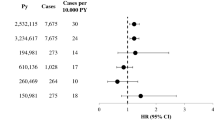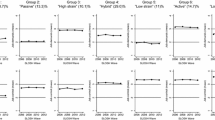Abstract
The current study assumes that workers actively influence the characteristics of their work environment. Not only will one's work environment (job characteristics) affect personal characteristics, such as feelings of depression; depression in turn is expected to affect the characteristics of one's work environment as well. Using a sample of 593 young Dutch workers, a longitudinal model relating feelings of depression and job characteristics to each other was tested using structural equation modeling. The results largely supported our expectations. Depressive workers were less likely to experience a job transition than non-depressive workers. If depressive workers did experience a job transition, work outcomes were less positive than for nondepressive workers. Thus, it appears that the relation between job characteristics and depression can be construed as a reciprocal relation. Implications and limitations of the study are discussed.
Similar content being viewed by others
REFERENCES
Bentler, P. M., & Bonett, D. G. (1980). Significance tests and goodness of fit in the analysis of covariance structures. Psychological Bulletin, 88, 588–606.
Costa, P. T., McCrae, R. R., & Zonderman, A. B. (1987). Environmental and dispositional influences on well-being: Longitudinal follow-up of an American national sample. British Journal of Psychology, 78, 299–306.
Feij, J. A. (in press). Work socialization of young people. In P. J. D. Drenth, H. Thierry, & C. J. De Wolff (Eds.), Handbook of work and organizational psychology. New York: Wiley.
Feij, J. A., Whitely, W. T., Peiró, J. M., & Taris, T. W. (1995). The development of career enhancing strategies, and content innovation: A longitudinal study of new workers. Journal of Vocational Behavior, 46, 231–256.
Goldberg, D. (1972). The detection of psychiatric illness by questionnaire. London: Oxford University Press.
Jöreskog, K. G., & Sörbom, D. (1993). LISREL-8 (user's manual). Chicago: Scientific Software.
Lerner, R. M. (1984). On the nature of human plasticity. New York: Cambridge University Press.
Lubin, B. (1965). Adjective checklists for the measurement of depression. Archives of General Psychiatry, 12, 57–62.
Marsh, H. W., Balla, J. R., & McDonald, R. P. (1988). Goodness-of-Fit indexes in confirmatory factor analysis: The effect of sample size. Psychological Bulletin, 103, 391–410.
Mortimer, J. T., & Lorence, J. (1979). Work experience and occupational value socialization: A longitudinal study. American Journal of Sociology, 84, 1361–1385.
Mortimer, J. T., Finch, M. D., & Kumka, D. S. (1986). Persistence and change in development: The multi-dimensional self concept. Life-span development and behavior, 4, 263–313.
Rooijen, L. van (1979). Widows' bereavement: Stress and depression after 1.5 years. In I. G. Sarason & C. D. Spielberger (Eds.), Stress and anxiety (Vol. 6). Washington: Hemisphere.
Rooijen, L. van, & Vlaander, G. P. J. (1984). Dramatic induction of depressive mood. Journal of Clinical Psychology, 40, 1318–1322.
Schaufeli, W. B., Maslach, C., & Marek, T. (1993). Professional burnout: Recent developments in theory and research. Washington, DC: Taylor & Francis.
Schreurs, P. J. G., & Taris, T. W. (in press). Construct Validity of the Demand-Control Model: A Double Cross-Validation Approach. Work and Stress.
Velde, M. E. G van der, & Feij, J. A. (1995). Change of work perceptions and work outcomes as a result of voluntary and involuntary job change. Journal of Occupational and Organizational Psychology, 68, 273–290.
Velde, M. E. G. van der, Feij, J. A., & Taris, T. W. (1995). Stability and change of person characteristics among young adults: The effect of the transition from school to work. Personality and Individual Differences, 18, 89–99.
Winefield, A. H., Winefield, H. R., Tiggemann, M., & Goldney, R. D. (1991). A longitudinal study of the psychological effects of unemployment and unsatisfactory employment on young adults. Journal of Applied Psychology, 76, 424–431.
Author information
Authors and Affiliations
Rights and permissions
About this article
Cite this article
Taris, T.W., Bok, I.A. & Caljé, D.G. On the Relation Between Job Characteristics and Depression: A Longitudinal Study. International Journal of Stress Management 5, 157–167 (1998). https://doi.org/10.1023/A:1022988915062
Issue Date:
DOI: https://doi.org/10.1023/A:1022988915062




